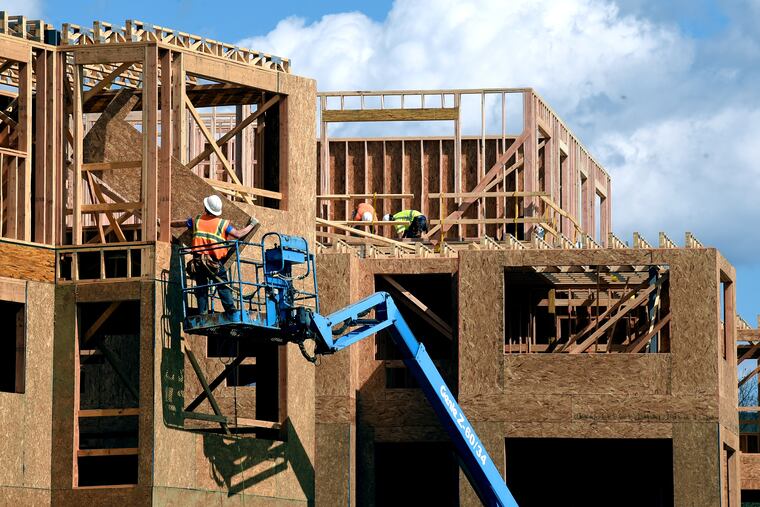Want to cut construction costs and ease rents in New Jersey? Reduce parking requirements, study says
A new study by the Rutgers Center for Real Estate finds that the minimum number of parking spaces imposed by the state is raising construction and rent costs in New Jersey.

A new study by the Rutgers Center for Real Estate at the Rutgers Business School finds that New Jersey’s parking space requirements for apartment developments far exceed demand, lead to higher construction costs, and increase rents.
Reducing the mandated minimum number of parking spaces per rental project would cut construction costs and lower rents as well, said Debra Tantleff, a coauthor of the study, “How Much Is Enough? Parking Usage in New Jersey Rental Units: Results from a Survey of Developers, Owners and Managers.”
“We don’t have enough housing,” said Tantleff, a New Jersey real estate professional. “There’s just not enough product being built, and the question is: How do we get it built faster and more efficiently?”
» READ MORE: How Americans’ obsession with parking has shaped our streets and cities
Launched in fall 2022, the study examined the impact of parking space minimums established by New Jersey’s Residential Site Improvement Standards. The researchers used census data, as well as survey responses from owners, property managers, or other representatives of 175 high-rise and low-rise apartment complexes across the state, and determined that the standards ”over require” parking spaces beyond the numbers needed or used by tenants.
The study estimated that the existing standards would require a hypothetical 400-unit high-rise to build 75 unnecessary parking spaces; that the added cost created by superfluous parking spaces is $13,950 per unit; and that adjusting the standards could reduce rents by nearly 4%.
“Parking has become a national topic of conversation. But while lots of conversations are happening, there hasn’t been enough data to support fundamental legislative change. We hope to help change the conversation,” Tantleff said of the study.
The following interview with Tantleff has been edited for clarity and length.
Parking has been an issue for more than a century. What’s different now?
The way we live is changing. People are working from home, ride-sharing services are growing, and the demand for parking is changing, too. There’s more flexibility in how often and when you need a car, and in the fact you don’t have to own a car to access one.
There’s also a strong demand for multifamily, mixed-use, transit-oriented development in walkable downtown neighborhoods of cities and suburbs. Developers are looking at repurposing office and retail properties for residential. And in New Jersey, there’s a need to build more inclusionary affordable housing because municipalities have signed legally binding agreements with the Fair Share Housing Center to do so.
‘Affordable’ can mean different things to different people.
Today there is more recognition that homelessness is not something relegated to certain populations. People are starting to appreciate how many other people are going to food banks.
Affordability comes down to supply and demand. When we don’t have enough housing, the housing we do have is more expensive. And fewer people can afford it.
» READ MORE: A new community-driven initiative is asking Philly to spend more housing funds on the lowest-income households
Sounds like a great opportunity for developers.
There is consistent growth in this sector. But if developers are building extra parking spaces, they are wasting money and land on something they don’t need, and the cost burden for doing this falls on the environment, and the tenants.
Can parking minimums foster opposition to the size or density of proposed multifamily developments?
Yes. When the priority is the amount of parking, then density is being determined by a formula. But if designing for appropriate scale and density are the priority, the number of parking spaces can be rightsized for the proposed project.
New Jersey is a home-rule state. But municipalities use the state standard as a benchmark, and if that standard is modernized, then local communities will have an opportunity to better plan for the future.
What about New Jersey’s minimum requirements for EV charging stations in parking areas of multifamily developments?
We did include questions about this in our survey, but the majority of the properties we surveyed were built or in progress prior to the implementation of that legislation. We see the current conversation about EVs as more about the capacity of the grid.
Were you surprised by any of the findings?
What was most striking to me is how consistent the data are across the board, across the counties and across parking product types such as garages and surface lots.
Are you optimistic?
Parking is not a one-size-fits-all issue, but the regulations historically have been one-size-fits-all. We know we have a problem, and it’s not only a New Jersey problem. California is looking at parking minimums, too.
We don’t want to end up like California, and we think there is a path. We think we can do something with this.